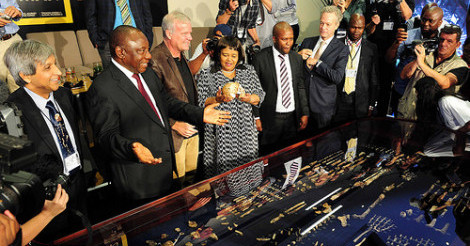
 )
)As I’ve done in the past, here is my take on what stood out the most in 2015 in the world of science and faith:
- Last Christmas brought an editorial from Eric Metaxas on fine tuning and scientific evidence for God which caused a stir to start off 2015. That led to a conversation on who is allowed to talk about science.
- Later in the year, similar questions arose concerning the papal encyclical on climate change. Does the Pope count as “enough” of a scientist to speak about climate change? And is it a problem that many people will be influenced by his words?
- These questions reflect the sentiment that religion should be kept far away from science (or, perhaps ideally, everywhere). The result, however, is the establishment of an orthodoxy of science which is at odds with both the ideal meritocracy of how science is supposed to function and the reality that our present understanding is incomplete.
- For example, this year we found a new hominin species and learned new things about Pluto. Knowing the world we live in is an ongoing process, invariably leaving uncertainty about the parts we haven’t seen yet. Is that altogether different from knowing God? After all, if God is infinite, there must be things we don’t know about God yet. And wouldn’t it be great if learning new things about the world helped us know God better in the process?
- Pluto wasn’t the only celestial body making headlines, as it was announced that there is likely water currently on Mars. That turned out to be great promotion for the film The Martian about a fictional Mars astronaut stranded there and trying to live long enough to get home. Even though the book and the film were pretty agnostic at best, the story is actually a fairly good parable for God’s extravagant rescue mission.
- In a crowded year for blockbusters and science fiction films, Avengers: Age of Ultron has been largely forgotten. Yet I still think it was the year’s single biggest fictional contribution to our collective mindset on science and religion, simply by virtue of being seen so widely and having so much to explicitly say on the topic.
- Looking ahead, I think X-Men: Apocalypse is the early frontrunner to occupy that slot in 2016. In a talk I gave at the BioLogos conference this summer (shamelessly embedded below), I pointed out that Apocalypse has a history in the comic books of reinforcing a very narrow and inaccurate view of evolutionary biology that is more difficult to reconcile with belief in God than the data require. I expect the film will be similarly problematic. Since that talk, the first trailer went even further in establishing the film’s place in the science & religion conversation, as Apocalypse claims to be the inspiration for all religions and another character speculates that he is the inspiration for elements of Revelation. Whatever the film ultimately has to say on these topics, you can be sure I’ll cover it here in 2016!
Andy has worn many hats in his life. He knows this is a dreadfully clichéd notion, but since it is also literally true he uses it anyway. Among his current metaphorical hats: husband of one wife, father of two teenagers, reader of science fiction and science fact, enthusiast of contemporary symphonic music, and chief science officer. Previous metaphorical hats include: comp bio postdoc, molecular biology grad student, InterVarsity chapter president (that one came with a literal hat), music store clerk, house painter, and mosquito trapper. Among his more unique literal hats: British bobby, captain’s hats (of varying levels of authenticity) of several specific vessels, a deerstalker from 221B Baker St, and a railroad engineer’s cap. His monthly Science in Review is drawn from his weekly Science Corner posts — Wednesdays, 8am (Eastern) on the Emerging Scholars Network Blog. His book Faith across the Multiverse is available from Hendrickson.

Leave a Reply